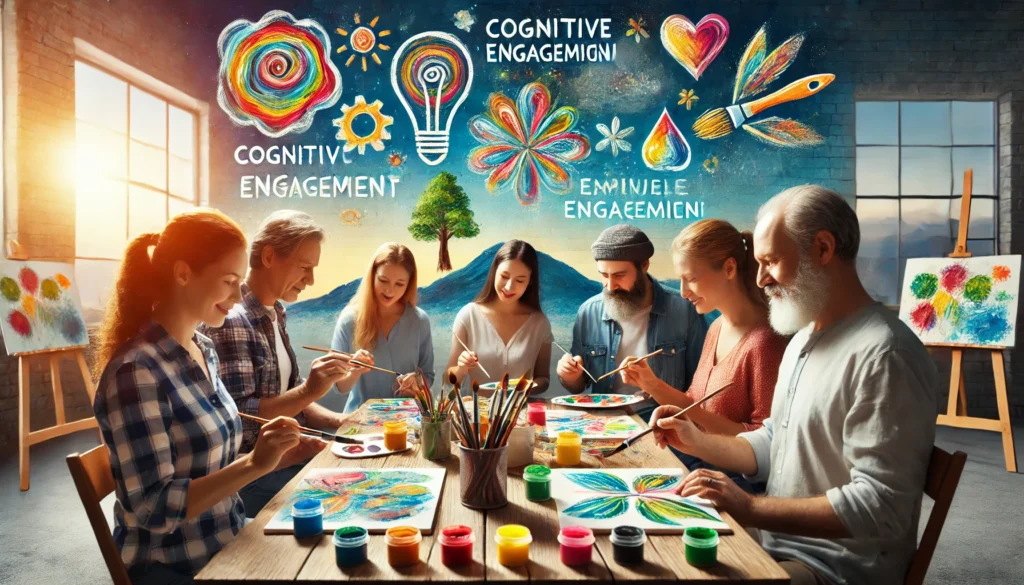In our fast-paced world, maintaining sharp cognitive skills is essential for personal and professional success. Just like any muscle in the body, the brain needs regular exercise to stay healthy and efficient. Engaging in cognitive activities not only helps improve mental agility but can also delay the onset of cognitive decline as we age. This article delves into engaging cognitive activities for adults, providing a comprehensive overview of how these activities boost brainpower.
You may also like: Boost Your Mind: Top Brain Games
Understanding Cognitive Activities
Cognitive activities encompass a range of tasks that require mental effort and focus. These activities stimulate the brain, enhancing memory, problem-solving abilities, and critical thinking skills. They are crucial for maintaining cognitive processing speed and overall brain health. Whether you’re a health and wellness coach, a science journalist, or a biohacker, understanding cognitive activities can aid in optimizing brain function for yourself and others.
Different Types of Cognitive Activities
Cognitive activities can be categorized into various types, each targeting specific areas of the brain. Verbal tasks, like reading and writing, enhance linguistic skills and comprehension. Numerical activities, such as Sudoku and math puzzles, improve logical reasoning and quantitative abilities. Spatial tasks, like jigsaw puzzles, enhance visual and spatial reasoning. Each type contributes uniquely to overall cognitive health, offering diverse ways to engage the mind.
Cognitive Activities and Emotional Intelligence
While cognitive activities primarily focus on intellectual capabilities, they also play a significant role in emotional intelligence. Activities that require empathy and understanding, like role-playing games or group problem-solving, help in developing emotional regulation and social skills. By engaging in these tasks, individuals can improve their ability to navigate social complexities and enhance interpersonal relationships.
Importance of Cognitive Flexibility
Cognitive flexibility is the ability to adapt thinking and behavior in response to changing environments or rules. Activities that promote cognitive flexibility, such as learning new skills or engaging in strategy games, are vital for adapting to new situations. This adaptability is crucial in today’s dynamic world, where problem-solving and innovation are highly valued.
The Science Behind Cognitive Stimulation
The human brain is an extraordinary organ, capable of adapting and growing throughout our lives, a phenomenon known as neuroplasticity. Cognitive activities promote neuroplasticity by encouraging new neural connections and strengthening existing ones. This adaptability can lead to improved cognitive functions and greater mental resilience.
Neuroplasticity: The Brain’s Ability to Adapt
Neuroplasticity is the brain’s remarkable ability to reorganize itself by forming new neural connections. This capacity for change is what allows us to learn and adapt throughout our lives. Engaging in cognitive activities provides the necessary stimulus for neuroplasticity, encouraging the brain to develop new pathways and enhance existing ones, which can lead to improved cognitive performance and resilience against age-related decline.
Cognitive Reserve: Building a Buffer Against Decline
Cognitive reserve refers to the brain’s ability to improvise and find alternative ways of getting a task done. It acts as a buffer against cognitive decline, often associated with aging or neurological conditions. Engaging in mentally stimulating activities helps build this reserve, allowing individuals to maintain cognitive function even when faced with brain changes or damage.
The Role of Dopamine in Cognitive Stimulation
Dopamine, a neurotransmitter, plays a critical role in motivation and reward-driven learning. Cognitive activities that are both challenging and enjoyable can trigger dopamine release, reinforcing positive behavior and encouraging continued engagement in cognitive tasks. This neurotransmitter not only boosts mood but also enhances learning and memory retention.

Examples of Cognitive Activities
Puzzles and Brain Teasers
Puzzles and brain teasers are excellent examples of cognitive activities that challenge the mind. Jigsaw puzzles, crossword puzzles, and Sudoku require strategic thinking and problem-solving skills, which can enhance cognitive abilities over time. These activities demand focus, patience, and persistence, all of which contribute to improved mental agility.
Jigsaw Puzzles: Enhancing Spatial Reasoning
Jigsaw puzzles are particularly effective for enhancing spatial reasoning skills. They require the ability to visualize pieces fitting together, honing the brain’s ability to process shapes and patterns. Completing these puzzles can improve hand-eye coordination and fine motor skills, making them a comprehensive cognitive exercise.
Crossword Puzzles: Boosting Verbal Skills
Crossword puzzles challenge verbal skills by requiring the solver to recall vocabulary and make connections between words. They enhance linguistic abilities and improve memory recall. Regular engagement with crosswords can expand vocabulary and improve language comprehension, offering a fun way to keep the brain engaged.
Sudoku: Strengthening Logical Reasoning
Sudoku puzzles are excellent for strengthening logical reasoning and numerical skills. These puzzles require strategic thinking and pattern recognition, improving problem-solving abilities. Solving Sudoku regularly can enhance cognitive flexibility and focus, making it a valuable cognitive activity.
Learning a New Language or Instrument
Learning a new language or musical instrument is a powerful cognitive exercise. It not only engages multiple areas of the brain but also improves memory and cognitive flexibility. Studies have shown that bilingual individuals often have better attention and task-switching capacities than monolinguals. Similarly, playing a musical instrument enhances auditory processing and motor skills.
Language Learning: Enhancing Cognitive Flexibility
Language learning enhances cognitive flexibility by requiring the brain to switch between different linguistic systems. This ability to adapt between languages strengthens mental agility and improves multitasking skills. Learning a new language can also improve memory and increase cultural awareness, offering both cognitive and social benefits.
Musical Training: Boosting Memory and Coordination
Musical training engages both hemispheres of the brain, improving coordination and memory. Playing an instrument requires the simultaneous processing of auditory and motor tasks, enhancing neural connectivity. Regular musical practice can improve fine motor skills and auditory processing, offering a holistic cognitive workout.
Combining Language and Music: Maximizing Cognitive Gains
Combining language learning with musical training can maximize cognitive gains. Both activities enhance auditory processing and memory, and together, they can lead to greater improvements in cognitive flexibility. Engaging in both activities offers a comprehensive approach to boosting brainpower.
Strategic Games
Strategic games such as chess, Go, and various card games offer a fun and competitive way to boost cognitive processing. These games require planning, foresight, and adaptability, engaging multiple cognitive processes simultaneously. The strategic thinking involved in these games enhances problem-solving skills and decision-making capabilities.
Chess: Developing Strategic Thinking
Chess is renowned for developing strategic thinking and foresight. Players must anticipate opponents’ moves and plan several steps ahead, improving problem-solving skills and cognitive endurance. Regularly playing chess can enhance concentration and memory, offering a robust cognitive challenge.
Go: Enhancing Pattern Recognition
Go, an ancient board game, is excellent for enhancing pattern recognition and strategic planning. The game involves complex patterns and requires players to anticipate moves, improving cognitive flexibility. Engaging with Go can enhance visual-spatial reasoning and analytical skills, making it a valuable cognitive exercise.
Card Games: Improving Decision-Making Skills
Card games, such as bridge or poker, require quick thinking and adaptability. These games improve decision-making skills and enhance memory recall under pressure. Regularly playing card games can boost cognitive processing speed and social skills, offering both mental and social benefits.
Cognitive Stimulation Activities in Daily Life
Integrating cognitive activities into daily routines doesn’t have to be daunting. Simple adjustments can make a significant difference in cognitive health.
Mindful Meditation
Mindful meditation is a cognitive activity that promotes focus and clarity. Practicing mindfulness can reduce stress, enhance attention, and improve emotional regulation. Regular meditation sessions can lead to long-term changes in brain structure, fostering improved cognitive functions.
Techniques for Effective Mindful Meditation
Effective mindful meditation involves focusing on the present moment while calmly acknowledging and accepting one’s feelings and thoughts. Techniques such as focused breathing, body scan, and guided imagery can enhance mindfulness. These practices reduce stress and improve attention, offering a tranquil way to enhance cognitive health.
Benefits of Regular Meditation Practice
Regular meditation practice can lead to significant cognitive benefits, including increased attention span and improved memory retention. By reducing stress and promoting relaxation, meditation fosters a conducive environment for cognitive growth. Over time, these benefits can translate into improved emotional regulation and mental resilience.
Incorporating Mindfulness into Daily Routines
Incorporating mindfulness into daily routines can be as simple as taking a few minutes each day to focus on breathing or engage in a brief meditation session. Mindfulness can also be practiced during daily activities, such as walking or eating, by focusing on the sensations and experiences of the present moment. These practices encourage mental clarity and cognitive engagement.
Engaging in Creative Arts
Creative arts, such as painting, writing, or crafting, are excellent for cognitive stimulation. These activities encourage imagination and problem-solving, promoting brain health. Engaging in creative arts allows for self-expression while simultaneously enhancing cognitive abilities.
Painting: Enhancing Visual-Spatial Skills
Painting is a creative activity that enhances visual-spatial skills by requiring the artist to understand and manipulate colors, shapes, and perspectives. This activity encourages problem-solving and imagination, fostering cognitive growth. Engaging in painting can improve hand-eye coordination and fine motor skills, offering a comprehensive cognitive workout.
Writing: Improving Linguistic and Analytical Skills
Writing involves linguistic and analytical skills, enhancing vocabulary and comprehension. Whether creative writing or journaling, this activity encourages self-expression and critical thinking. Regular writing practice can improve memory retention and cognitive flexibility, providing a valuable outlet for cognitive engagement.
Crafting: Developing Fine Motor Skills
Crafting activities, such as knitting or woodworking, develop fine motor skills and enhance hand-eye coordination. These activities require planning and problem-solving, improving cognitive flexibility. Engaging in crafting offers a relaxing way to boost cognitive health while creating tangible outcomes.

The Historical Context and Future Implications
Historically, great thinkers and innovators have engaged in cognitive activities to enhance their intellectual prowess. From the Socratic dialogues in ancient Greece to the strategic war games of Sun Tzu, cognitive stimulation has been a cornerstone of human advancement.
Historical Examples of Cognitive Engagement
Throughout history, cognitive engagement has been a crucial aspect of intellectual development. Ancient philosophers, such as Socrates, used dialogues to stimulate critical thinking and explore complex ideas. Similarly, historical figures in science and art, like Leonardo da Vinci, engaged in diverse cognitive activities, from scientific experiments to artistic endeavors, showcasing the power of cognitive stimulation.
The Evolution of Cognitive Activities
Cognitive activities have evolved over time, influenced by cultural and technological advancements. In the past, cognitive engagement often involved physical games and puzzles, while today, digital platforms offer new ways to stimulate the brain. The evolution of these activities reflects the changing nature of cognitive engagement, offering broader opportunities for mental growth.
Future Implications for Cognitive Health
Looking to the future, as our understanding of the brain continues to evolve, cognitive activities will play an increasingly vital role in enhancing brain health. With advances in neuroscience and biohacking techniques, new cognitive activities and tools will emerge, offering even more robust ways to boost brainpower. The integration of technology and cognitive engagement will provide innovative approaches to maintaining cognitive health and fostering lifelong learning.
Practical Tips for Boosting Cognitive Functions
For those looking to incorporate cognitive activities into their routine, consider the following practical tips:
- Diverse Engagement: Mix different types of cognitive activities to stimulate various brain areas. Balance logical puzzles with creative tasks for comprehensive cognitive engagement.
- Consistency is Key: Regularly engaging in cognitive activities yields the best results. Aim for daily or weekly exercises to maintain and improve cognitive health.
- Challenge Yourself: Step out of your comfort zone. Tackling increasingly difficult tasks can enhance cognitive endurance and flexibility.
Tailoring Cognitive Activities to Your Interests
Tailoring cognitive activities to your interests can increase engagement and enjoyment. Choose activities that align with your passions, whether it’s music, art, or strategic games, to ensure sustained cognitive engagement. Personalizing activities can make cognitive stimulation a rewarding and fulfilling experience.
Balancing Cognitive and Physical Activities
Balancing cognitive activities with physical exercise can enhance overall brain health. Physical activities, such as yoga or dance, complement cognitive tasks by promoting blood flow to the brain and reducing stress. This balance offers a holistic approach to maintaining cognitive and physical well-being.
Setting Realistic Goals for Cognitive Improvement
Setting realistic goals for cognitive improvement can help maintain motivation and track progress. Start with manageable tasks and gradually increase complexity as cognitive skills improve. Clear goals provide a framework for cognitive engagement, ensuring consistent progress and sustained motivation.

Conclusion
Engaging in cognitive activities is crucial for maintaining and enhancing brainpower. By incorporating a variety of cognitive tasks into daily life, adults can enjoy a more agile mind, improved memory, and a greater capacity for problem-solving. Whether you’re guiding clients as a health and wellness coach, translating scientific data as a science journalist, or optimizing your mental health as a biohacker, understanding and leveraging cognitive activities can pave the way for a sharper, more resilient brain. By fostering a culture of cognitive engagement, we can ensure a future where mental agility and intellectual prowess are within reach for all.
Further Reading:
Mind Stimulating Activities & Cognitive Games for Seniors
Activities from Cognitive Stimulation Therapy (for Dementia)
Important Note: The information contained in this article is for general informational purposes only, and should not be construed as health or medical advice, nor is it intended to diagnose, prevent, treat, or cure any disease or health condition. Before embarking on any diet, fitness regimen, or program of nutritional supplementation, it is advisable to consult your healthcare professional in order to determine its safety and probable efficacy in terms of your individual state of health.
Regarding Nutritional Supplements Or Other Non-Prescription Health Products: If any nutritional supplements or other non-prescription health products are mentioned in the foregoing article, any claims or statements made about them have not been evaluated by the U.S. Food and Drug Administration, and such nutritional supplements or other health products are not intended to diagnose, treat, cure, or prevent any disease.


